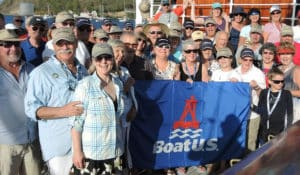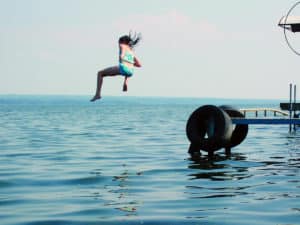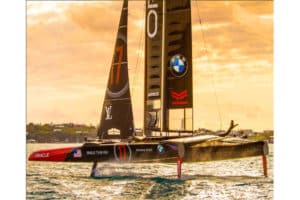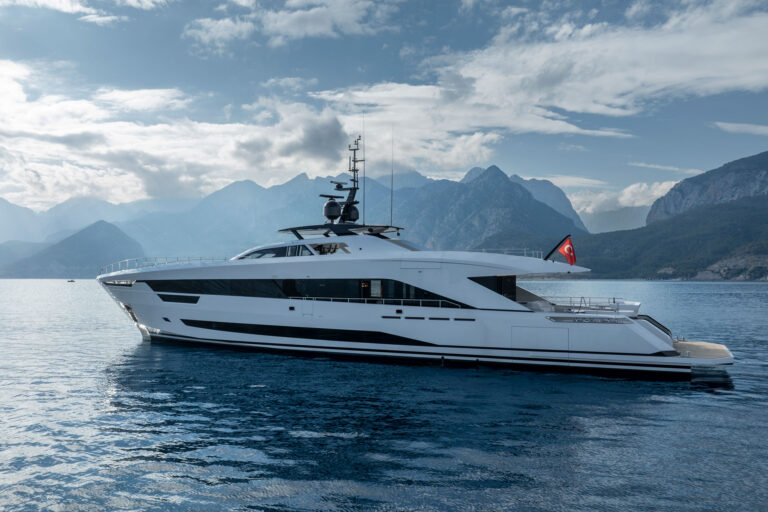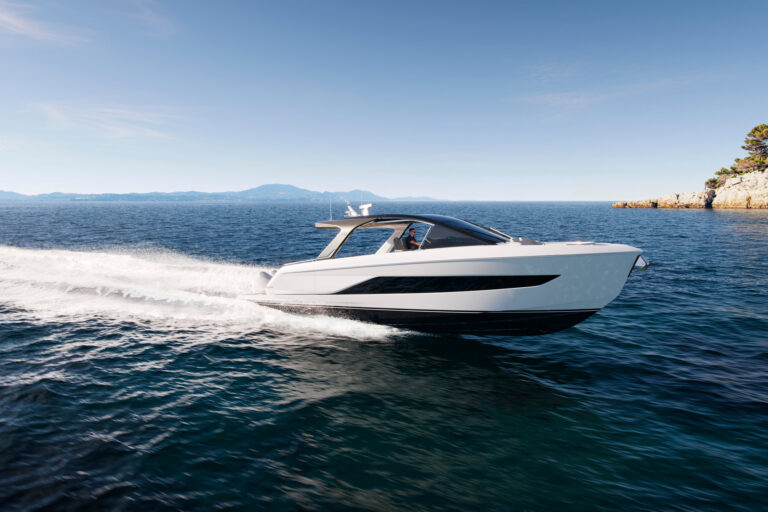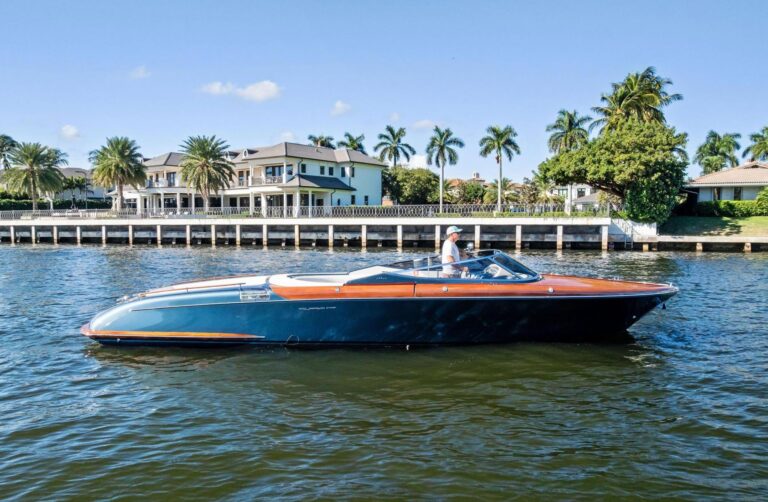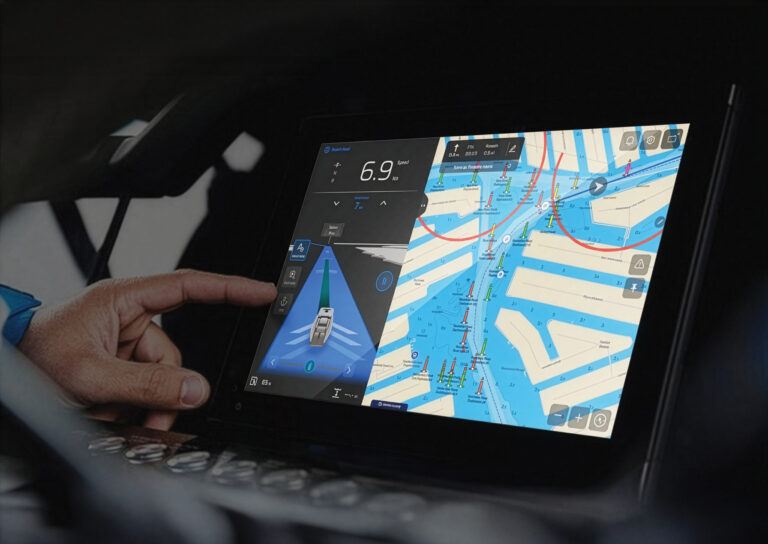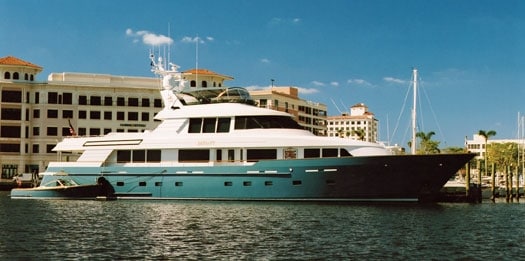
McGraw has always been loyal to a few builders, including Delta Marine, which built his new 127-foot Defiant .
Some years ago, Sue Hood, wife of yacht designer Ted Hood, was standing in Donald McGraw’s boathouse on Cape Cod, looking at walls covered by half-models of all the different boats McGraw has owned in his life. “You’re just like a woman,” she said. “You can’t make up your mind which one you like the best.”
Now living in Florida, McGraw grins wryly as he tells the story. “She was right, you know,” he says, his face crinkling with laughter. “Just as soon as I had one boat, I’d start thinking about the next.”
You may not know Don McGraw, but you know the name McGraw-Hill, the global empire that provides financial and information services ranging from Business Week to Standard & Poor’s as well as school textbooks.
The grandson of McGraw-Hill cofounder James McGraw (the man who coined the word “electronics” in 1926 from the electron tube), Don dismisses his involvement in the family-run business with a casual wave of his hand. It’s clear he would rather talk boats than business.
Today his fleet includes Defiant, a 124-foot Delta, and a Hinckley 29-foot runabout. “Yes,” he admits, “after years as a sailor, I’ve gone over to ‘The Dark Side.’ But sailing has been my life.” McGraw discovered sailing when he was sent to summer camp as a nine-year-old and never looked back. He badgered his father for a boat, but his first was literally a wreck: the hulk of a Marconi catboat that his father bought on the condition that his son restore it. It was full of broken frames, but the youthful McGraw spent hours hanging around a shipwright, who showed him how to sister the frames.
That boat was followed by a traditional Wianno Senior, a 25-foot gaff-rigged catboat, but World War II made that a short-term ownership. “I wasn’t doing particularly well in school, in part because I was fooling around with boats. Although I was only 16, my father agreed to sign that I was actually 17 so I could join the Navy.”
Trained as a gunner’s mate, McGraw spent the war in the Pacific aboard a destroyer escort, becoming the Navy’s second-youngest chief: “I know, because I knew the youngest,” he laughs. “The Navy trained me and taught me about obedience, but most of all I learned about people and about leadership.” His ship, the McClelland, was in the center of the Pacific theater, escorting landing craft to the beach on Iwo Jima, dodging kamikazes at Leyte Gulf and supporting troops at Okinawa.
His ship also survived the deadly typhoon that devastated the Third Fleet late in the war. “I remember passing the capsized bottom of a Fletcher-class destroyer, looking at the propellers sticking up in the air, and thinking all those men.” At war’s end, McGraw was anchored in Tokyo Bay and witnessed the signing of the surrender aboard the battleship Missouri.
He returned home and attended Carnegie Tech (now Carnegie-Mellon) and Harvard, studied graphic design and ended up with a degree in mechanical engineering.
After college, his father told Don to “go do something and see if you’re worthwhile.” So he spent time in an ad agency, and then approached McGraw-Hill for a job. “Don’t hire him-we have too many McGraws here already,” was his father’s response. Don was hired anyway, starting in sales and marketing and went on to build a lifetime career in the family business, including a stint as group president of international publishing.
The Wianno had been sold during the war, and McGraw’s first acquisition was a Robb 35, an early Cheoy Lee sloop built mostly of teak. Traditional designs followed, starting with a Hinckley-built Tripp-designed Bermuda 40 and then a Hinckley Sou’Wester 48. “Great boats,” he says, glancing at a wall in his office with their photos. Then came the first of three Ted Hood designs, a 38-foot centerboard sloop.
It wasn’t long before Hood’s Little Harbor 50 caught his eye. “That was the best sailboat I’ve ever had,” he says, nodding at a photo. “We did terribly well racing that boat-it was beautifully balanced.”
But McGraw had itchy feet and soon moved up to a Little Harbor 63 ketch. “We did well with that boat because of our secret sail-the mizzen staysail. In those days, a ketch had a good rating and you could spread a lot of sail downwind.” Skippering his various boats, McGraw became a regular on the regatta circuit and in the Bermuda Race. And from 1958 on, he was a member of one America’s Cup syndicate or another.
During that time, McGraw took his first foray into powerboats, buying a 95-foot Palmer-Johnson that he restored for the charter business. But two incidents soon soured him on chartering. The first was when guests smuggled marijuana aboard (“It took weeks to air the boat out”); and the second, when a family with unruly children literally trashed the boat (“It took two years to fix the scars”). He sold the boat to Grant Tinker, the producer of The Mary Tyler Moore Show.
Though he doesn’t keep his boats long, McGraw enjoys long-term relationships with builders, having owned several Hinckleys as well as a string of boats built by Ted Hood. He’s now on his second Delta Marine motoryacht, which he says is “head and shoulders above any builder in composite construction.”
He built his first Delta, a 117-footer, but acquired his current 124-foot Defiant when she was partially finished and the owner defaulted. “I wanted that extra stateroom and I liked the idea of a skylounge, so I put in a bid and got her. Then we spent a lot of time and money to make her look yare.” The “we” in this case includes Capt. John Doty, who has been with McGraw for 19 years.
The first Delta was named Rainbow, after the huge America’s Cup J-Class yacht that had awed him when he was a youngster and, between Rainbow and Defiant, McGraw has put a lot of miles under the hulls. He’s cruised the Caribbean, the Pacific Northwest and Alaska, and ventured as far north as Labrador and Newfoundland.
“I prefer to anchor out,” he says, “but that doesn’t always work for my sons and my grandkids. I can spend a few hours at Atlantis in the Bahamas, but they can stay for days,” he says, shaking his head and adding, “My pleasure is showing one of my granddaughters a four-foot iguana on a deserted island.”
Behind his office on the Intracoastal Waterway sits his Hinckley 29 runabout which he tows behind Defiant as a tender. “It’s way too fast for me-I’m a 12- to 15-knot guy,” he admits, but adds that it’s perfect for water sports and exploring.
Though McGraw retired from McGraw-Hill, he kept his hand in publishing. With Joe Gribbins and Marty Pederson, he launched Nautical Quarterly in the 1970s, first as a slip-cased coffee-table book and later as a hardcover magazine. “It was about everything I love,” says McGraw, “boats, nautical history, maritime art, sailors, racing.”
McGraw also bought Soundings, the northeast boating newspaper, and put the two publications together in Essex, Conn. Spin-offs followed, including Soundings Trade, a woodworking magazine and another on waterfront real estate.
Through it all, Don McGraw has had a fascination with maritime history and art. He is on the advisory board of Mystic Seaport, and plans to donate his extensive art collection there. In fact, his office seems like a Florida annex of that museum: Everywhere you look is nautical memorabilia. In a warehouse is the mast top of the J-Boat Ranger he acquired when he bought a Rhode Island restaurant, as well as the jib clew from the J-Class Rainbow, given to him by sailmaker Colin Ratsey.
Sitting in his office, in a crisp Oxford cloth button-down shirt, natty shorts and a pair of sea-weary Topsiders, McGraw admits to having an 80th birthday but has the vigor and curiosity of a man decades younger. Among his many projects, McGraw is developing luxury townhouses in Florida. “I’m a frustrated architect,” he says, “so this is fun.” He’s also writing stories “just for my own amazement,” he says with a laugh. “I don’t see the end of my yachting years,” he says decisively.
“I’m having a wonderful life being ‘not semi-retired,'” McGraw says. Holding up an address book, he notes, “There are too many names in here with lines through them. And that’s because they didn’t have anything to do when they retired after a few games of golf, they were gone,” he says.
“I’ve still got a lot of islands to explore and I have a life full of things to do. I plan to keep going and have a good time for a long while.”

